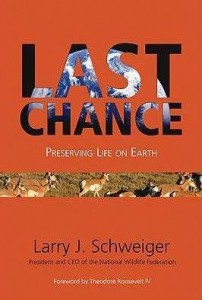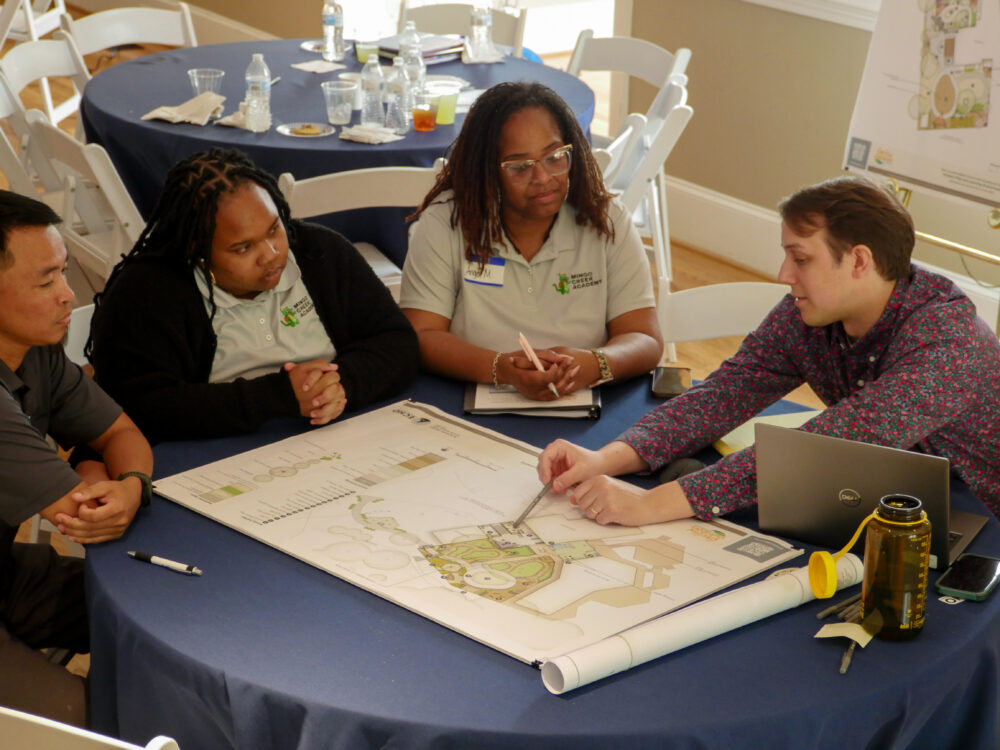We have much more to do and your continued support is needed now more than ever.
Book Review: Last Chance
 In his debut book, Larry Schweiger, President and CEO of the National Wildlife Federation, paints a clear picture of the risks we are taking by continuing to emit greenhouse gasses instead of moving to a more sustainable, carbon-free society.
In his debut book, Larry Schweiger, President and CEO of the National Wildlife Federation, paints a clear picture of the risks we are taking by continuing to emit greenhouse gasses instead of moving to a more sustainable, carbon-free society.
Although there have been many books dedicated to environmental issues, Last Chance: Preserving Life on Earth, emphasizes the idea that changes to the climate are occurring due to human behavior, and therefore require human recompense. Schweiger states, “Like it or not, global warming is the defining issue of the twenty-first century, and this may be the defining moment for an all-out effort to avoid a climate crisis.”
Last Chance argues that climate change is primarily a moral challenge, rather than a scientific or a technical one. We are, Schweiger asserts, responsible to protect the future of the planet for our children’s future. “This book is a call from an outdoorsperson who harbors respect for science, a Christian perspective, and a lifelong love for this gift we call nature. I believe that each of us has a moral and stewardship obligation for nature regardless of our faith, politics, or worldview.” It’s no surprise that his religious background informs his activism; his language is downright Biblical at times: “Surely we can agree that wrecking the planet is an ethical abomination.”
Schweiger is not the only one who claims a moral obligation to address climate change. In a recent interview with Yale University’s Environment 360, the chairman of the Intergovernmental Panel on Climate Change (IPCC), Rajendra Pachauri, said “As a human being, I just couldn’t keep quiet in the face of all this overwhelming evidence. I know it’s probably not right for me to take a position such as this, but on the other hand, I think it would be totally immoral on my part not to take a position, so I came out and said so.”
Scientific research has been suggesting since the early 1970’s that we are at risk from the dangerous aftereffects of climate change, yet greenhouse gas emissions continue to rise, well beyond the 350 ppm of carbon dioxide in the atmosphere that we know is safe. As of writing, levels are 385ppm. Against the recommendations of the world’s leading scientists and the IPCC, nations and individuals are procrastinating action.
Schweiger notes that ecologists are already seeing the effects of climate change in wildlife. Many plants and animals are highly sensitive to their environments, so as those environments change, so will their behavior. For example, although sea turtles have been on earth for millenia, rising temperatures in sea water may threaten their populations within a matter of years. Sea turtles are dependent on water temperature to determine the sex of the turtle (“temperature-dependent”), similar to some species of crocodiles, alligators and other turtles. Male sea turtles are born if temperatures are below 86°F, females above 86°F, and anything above 93°F often causes incubation to be fatal. As oceans continue to warm, fewer male sea turtles will be born, or incubations will fail altogether. Schweiger’s wildlife background helps him describe the ways in which discrete changes to parts of the natural environment ripple out to threaten the entire ecosystem, of which humans are a part.
Last Chance is, more than anything, a rally to action for the American people. Throughout the book, Schweiger gives the reader tips, suggestions, and ideas about taking action on climate change and connecting with nature. He encourages the use of social networking sites like Facebook, Twitter, and blogs to heighten the level of concern for climate change. He also asks every reader to get involved by writing a letter or calling their Senators and President Obama. The heart of his campaign is a grassroots movement from citizens pushing their representatives to follow the science and pass comprehensive climate legislation.
Perhaps most importantly, Schweiger asks the readers to get outside and be a part of our natural world, arguing that we only save what we love. As he affirms, “Time spent in untrammeled nature is vivid, multisensory, and memorable. We are touched in visceral ways with the power and immediacy of our surroundings…” And lastly, Schweiger “urge[s] every parent, grandparent, aunt or uncle to make memories in nature with the children in [their] life. They will scarcely remember watching television with you, but in their heart, they will hold on to the times they spent in the wild with you.”





















